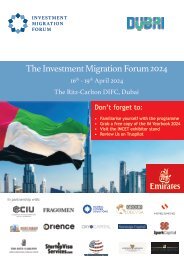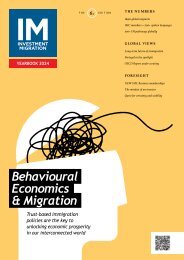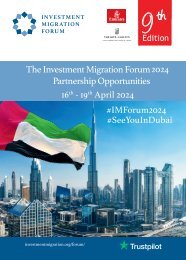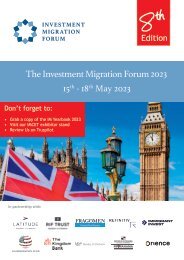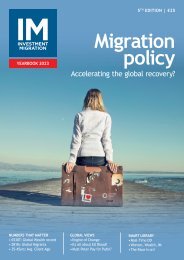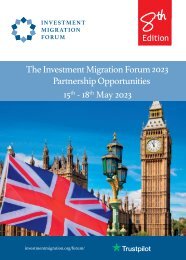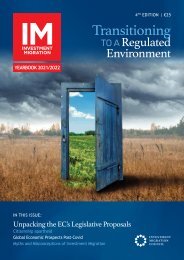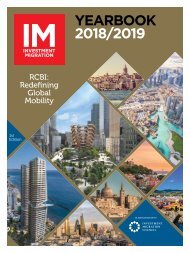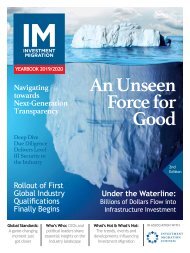IM Yearbook 2020/21
Born from the need for a global, credible, “go-to” publication, the 3rd IM Yearbook offers valuable access to a prime target audience of top industry influencers, decision makers, and the foremost referral network to the world’s most influential Investment Migration programmes: Government officials such as Heads of CIU’s, policy makers, academics, migration agents, law firms, wealth managers, financial advisors, real estate developers, and international firms involved in investment migration.
Born from the need for a global, credible, “go-to” publication, the 3rd IM Yearbook offers valuable access to a prime target audience of top industry influencers, decision makers, and the foremost referral network to the world’s most influential Investment Migration programmes: Government officials such as Heads of CIU’s, policy makers, academics, migration agents, law firms, wealth managers, financial advisors, real estate developers, and international firms involved in investment migration.
You also want an ePaper? Increase the reach of your titles
YUMPU automatically turns print PDFs into web optimized ePapers that Google loves.
REAL ESTATE<br />
REAL ESTATE INVESTMENT OPTIONS:<br />
HERE TO STAY<br />
BUT INFLOWS SHOULD BE BETTER MANAGED<br />
Real estate-linked investment migration programmes are a firm favourite among<br />
applicants; however, they do not always deliver the intended economic impact. The <strong>IM</strong><br />
<strong>Yearbook</strong> spoke with five industry experts about the appeal of the real estate route and<br />
what could be done to ensure that this investment option realises its full potential.<br />
The real estate sector has long been closely intertwined<br />
with the investment migration industry. Today, the large<br />
majority of residence- and citizenship-by-investment<br />
(RCBI) programmes offer a so-called real estate route, whereby<br />
the purchase of property is considered an eligible investment.<br />
Although property-based residency and citizenship programmes<br />
remain popular choices among investor migrants, industry<br />
experts say there is a need to better direct real estate inflows<br />
to avoid potential negative repercussions on the local real<br />
estate market and to ensure a wider economic impact.<br />
Real Estate Attraction<br />
“The real estate route is a well-tested option,” says Yiannos<br />
Trisokkas, Chairman of Henley & Partners Real Estate Committee<br />
and Director of Casamont, the real estate arm of Henley &<br />
Partners. It offers investors opportunities for income generation<br />
through leasing as well as a clear exit strategy, Trisokkas explains.<br />
However, especially in turbulent times, investors appreciate<br />
real estate investment as part of a long-term back-up plan, he<br />
says. “Without a doubt, after the Covid-19 experience, people<br />
will want to have a home in an alternative location as a backup<br />
in case we face similar situations.” Gaye Hechme, Managing<br />
Director of Island Living in Antigua and Barbuda, agrees.<br />
“With the advent of the Covid-19 pandemic, we are seeing a<br />
greater number of applicants looking to invest in property<br />
that gives them the option to live in a safe country, a place to<br />
reside should the need arise in today’s uncertain world.”<br />
Frederico Seixas of Investaureum says real estate is<br />
still the number one driver and vehicle for the investment<br />
migration industry. “Real estate has been for decades known<br />
as the most secure and solid investment when compared<br />
with other investments options such as government bonds.<br />
However, high-net-worth individuals do take advantage<br />
of these assets. Purchasing property is more than just<br />
fulfilling a government obligation. Properties are often<br />
used for family vacations, although many clients also<br />
appreciate the fact that real estate can be easily re-sold.”<br />
Christos Kotsaidis, CEO of Filia Investment, points<br />
to steadily rising real estate values in Greece. “Despite<br />
the Covid-19 pandemic, the real estate market in Greece<br />
keeps on a steady pace. There are many undervalued<br />
properties due to the country’s 10-year financial crisis that<br />
ended in 2019, which present an attractive investment<br />
opportunity. In my opinion, I won’t be surprised if we see<br />
an increase in property value of 15% to 20% in 20<strong>21</strong>.”<br />
Investment Migration <strong>Yearbook</strong> 2O2O/2O<strong>21</strong> 83




